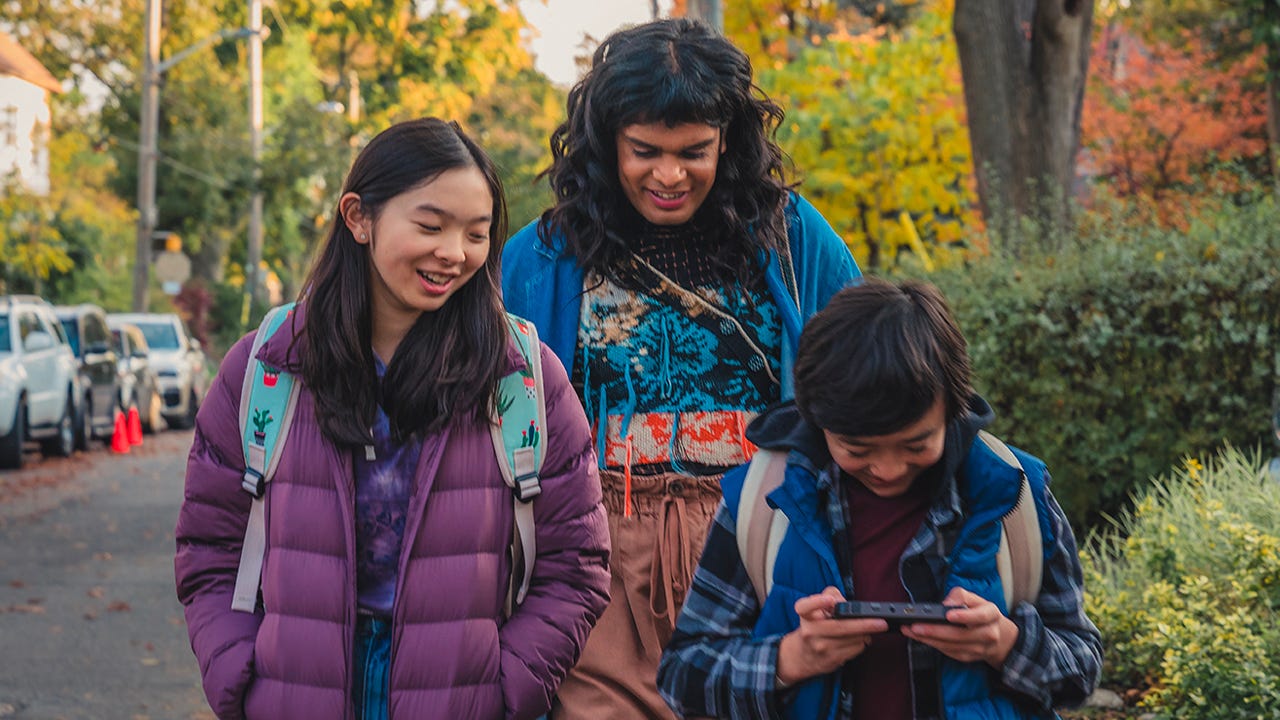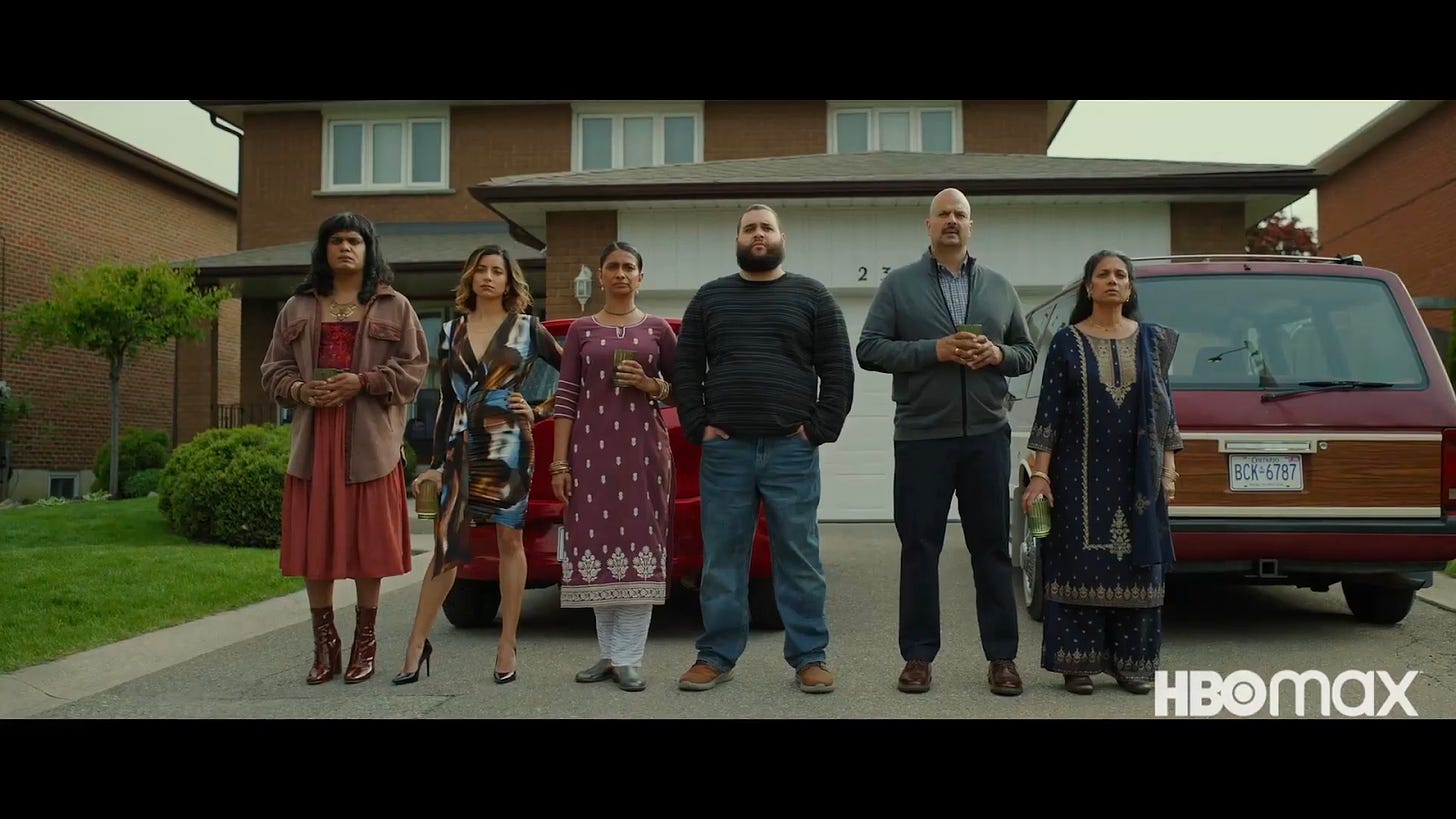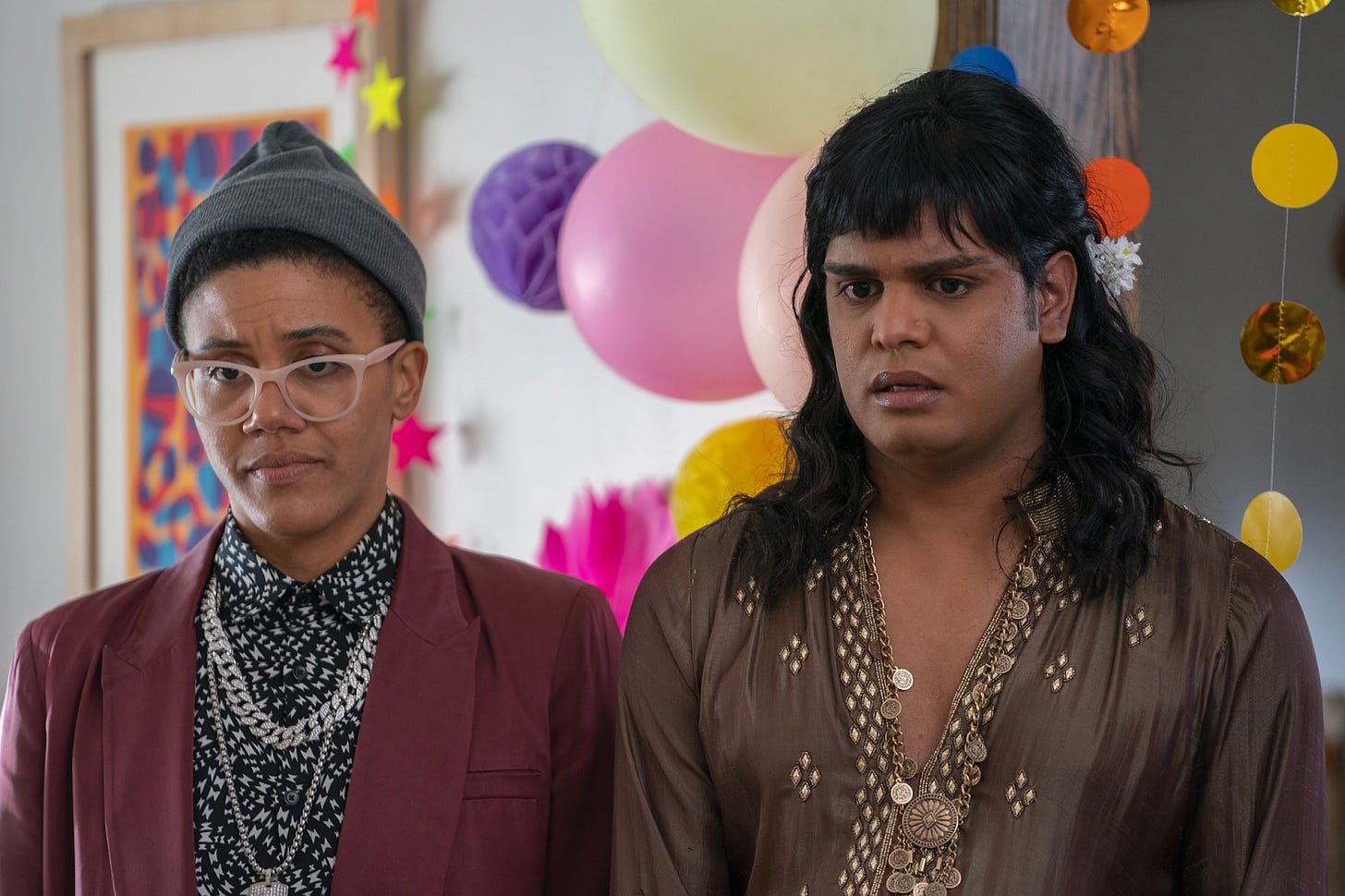Review: What Are You? Gender-Binary?
HBO Max's 'Sort Of' (Sort of Trans. Sort of family. Sort of lost.)
Hey kitty girl! Reminder that after this review is our new segment, ‘The Elephant in the Werkroom’. Read on for my thoughts on this week’s episode of RuPaul’s Drag Race Season 15! Or as I like to refer to it when I ask Key West bartenders if they’ll be playing it, “RuPaul’s”. ♥
The Yearning Rating: ✰✰✰✰
Romance ✰✰✰½
Sex ✰✰✰
Storytelling ✰✰✰✰✰
Performance ✰✰✰✰½
Yearning ✰✰✰✰✰
Light spoilers for Season 1 and 2 of Sort Of ahead.
Written by Meg Heim
I feel like no one is talking about this sweet little show. The Peabody Award-winning Sort Of is a big-hearted series centering on genderfluid, Pakistani-Canadian femme millennial Sabi Mehboob and how they navigate their messy, evolving queer life. Sabi, played by the show’s creator Bilal Baig, is a lot of things—a bartender, an ethical slut, the youngest child to Pakistani parents, a nanny to some really sweet kids. They’re a community builder—and in Sort Of, we gain access to the one they’ve created.
This is, at its heart, a slice of life show—but what makes it so special is that the life depicted is far from the standard order relatable TV character (white, cis, American, probably straight). And while centering someone in the story that is marginalized in more ways than one, the show deftly avoids sensationalizing any part of their lived experience. It’s a tender, 20-minute personal comedy about identity and finding the levity in the everyday, even when things are shitty.
In an impressively zippy 20-minute pilot episode, we immediately understand that Sabi is still looking for their place in the world, juggling two part-time jobs and a cheating boyfriend. When they’re not bartending at the queer bookstore/bar Bar Buk, they’re working as a nanny to Violet and Henry, the mixed-race kids of their friend Bessy (Grace Lynn Kung) and her narcissistic jerk of a husband, Paul (Gray Powell). (A private little joke is that Paul is somehow a therapist. How do we feel about therapist characters in TV and movies often being portrayed as terrible?)
Within the same twenty minutes, Sabi dumps the shitty boyfriend and gets fired, awkwardly, by Paul. But when Bessy gets into a terrible accident and falls into a coma, Sabi doesn’t hesitate to agree to stay in their nannying role and help the family out. As they arrive home to the apartment they share with their sister Aqsa, emotionally fraught from fielding Violet and Henry’s questions about their mom, they run into their own mother Raffo (Ellora Patnaik). The look on their mom’s face in this scene tells you everything you need to know—she has never seen her AMAB child in makeup, bangles, or feminine clothing. Sabi, horrified and exposed, stands there wordlessly, tears streaming down their face. What their mom says next feels like a thesis statement for the rest of the show: “Sabi…you’re crying. I can’t remember the last time I saw you cry.”
Sabi’s day to day is characterized always by their dispassionate and disaffected manner (i.e., you understand pretty quickly what Sabi’s mom is talking about). They’re exceedingly kind, but deliver every line with a precisely even and guarded flatness. I saw this as related to the dissociation they experience on a daily basis, as they move through a world not willing to accommodate the expansiveness of their own identity. I think this is commonplace for transfeminine people—an instinctive guardedness is the free toy in the trans Happy Meal. The humor of this series comes through particularly in their unwillingness to escalate a moment. Even if everyone around them is spinning out of control, their dry, deadpan responses can’t help but make you laugh. In one particularly funny moment, Sabi’s queer Black bestie 7even (Amanda Cordner) compares them to a Stepford wife with regards to their involvement in Henry and Violet’s lives. “Totally,” they say with almost no inflection. “I’m totally Nicole Kidman.” The humor shines through even as you can't help but reflect on the fact that Sabi responded to a question about how they are doing by only talking about Henry and Violet. (The dissociation is sadly real.)
As the first season unfolds, Sabi’s guarded exterior comes down one inch at a time as they entrench themselves in what it means to be a family. In one instant, they go from being out of a job to needing to essentially step in as a surrogate parent as Paul—newly alone due to Bessy being in a coma—spirals out of control and generally continues being selfish and inconsiderate. This is all while they are navigating their mother’s reaction to them being someone other than who she wanted them to be. But what feels thoughtful about this show is the pacing of this process between Sabi and their mom. Raffo is conflicted and curious in equal measure, all while still wanting a relationship with her child. Not to harp on this too much—but this show is grounded. Raffo isn’t pushing Sabi away in the hyper dramatic, I-will-never-love-you way that we see so often in queer or coming out narratives. She’s trying. There’s a push-pull as she makes mistakes and takes steps forward and loves her child throughout it regardless. In an endearing moment the two share, Raffo asks Sabi, “If you’re not a girl then…what are you? Gender…Binary?” (I can only hope she was doing some productive Googling).
This is a story that I imagine hits home for children of immigrants; the first season wrestles constantly with the idea of immigrant parents “providing a better life” for their children, and what that means to them, the implication of class in the service industry, and developing your own identity in a vastly different cultural landscape than the one your parents were raised in. Sabi’s dad—who mostly lives and works in Dubai—and how he will react to Sabi’s gender presentation is also a major focal point of the story. I think another valuable addition to the richness of this story is that Sabi’s two parents feel and react differently to Sabi’s gender; despite their traditional marriage appearing to be heavily tinged with cultural expectations of deferential women, Raffo operates and adapts independently of her husband.
Sabi plays a large role within Violet and Henry’s family dynamic at the same time that they are struggling to find a space for themselves within their own family. Part of what endears you to Sabi is their endless compassion for their people. They are constantly meeting people where they’re at.
Something else I really appreciate about this show is the casualness of Sabi’s sexuality. I feel like it’s so common for gender diverse characters on TV to have one love interest. The whole show or the sole romantic arc of the entire project feels like it's about that one person taking an interest in a trans or genderqueer character. I really like that Sabi is a sexual being; they aren’t othered for being femme presenting and not “passing” in a cisgendered, heteronormative way. It’s rewarding to see a story that’s not about someone deigning to like a genderqueer person. Even if that isn’t always the intention, it can feel that way when the experience is so built up and designed to feel so singular and special. There can almost be a hero-ey subtext. There’s magic in making it ordinary!
I began to reflect on this particularly with the introduction of Sabi’s exciting new friend, Olympia (Cassandra James). Olympia, a stunning trans woman, is that magnetic friend we’ve all had—usually there for a brief and torrid spell in our life. Someone who we can’t look away from and can’t stop chasing, no matter how little affirmation we get from them. (cc: Ali’s notes on Rachel Sennott in Tahara). Olympia, beautifully carefree and fun, isn’t able to cop to her own flightiness, which is a painful thing in a situationship. Continuing in this thread, when Sabi and Olympia’s relationship grows to include sex, it remains undefined. While Olympia’s friendship skills are still in question, I appreciated how inconsequential that was. I’d like to note that the fluttery possibility of Sabi’s other potential romantic interests over both seasons show just how much Baig gets it.
Sort Of’s supporting cast brings so much to the table in terms of balancing emotionally weighty themes with laugh out loud comedy. Amanda Cordner’s performance of 7even, the goofy and unapologetic child of a narcissistic art dealer, is inspired. She is your queer theater friend all grown up, proudly sharing their herpes diagnosis and going on dates with vapid nonbinary DJ influencers named Arrow.
As Season 2 progresses, there is a subtle and tactful growth in Sabi. They’re less dissociative and a better communicator. You can feel their love more clearly—it’s not always so heavily cloaked in distance and dispiritedness. The show tackles loss and growth and relishes in the harsh beauty of letting yourself change, whether you’re 13 or 33. It reminds me that we’re all in transition in life, broadly, one way or another. If Sort Of has a guiding principle, I think it’s that nobody is just one thing. We’re all sort of; piecing our identities, communities, families and dreams together.
Sort Of has been renewed for a Season 3! When you fly through the first two seasons of this show (gentle reminder that the episodes are only 20-minutes 😌), you’ll understand how ready I am for Season 3.
Sort Of is available to watch on HBO Max.
The Elephant in the Werkroom
Welcome to the second installment of our new segment, where we give you a quick rundown of our thoughts on the most recent episode of RuPaul’s Drag Race Season 15.
Episode 31:
MTV’s Golden Ratio: 60:15:15 (60 minute episodes, 15 minutes of commercials, 15 queens) (I don’t claim this ratio.)
By now, I’m sure I don’t have to tell you that Drag Race returning to MTV and jamming The Real Friends of Weho! in between Drag Race and Untucked has been reported to be one big fat marketing tactic so that gay people sit in bars for 3 hours on Friday nights and give MTV their dream viewing numbers.
But the more relevant consequence is that we are returning to 60-minute episodes versus the now-standard 1 hour 30 min episode. After commercials, 45 minutes of content is giving fast forward. It’s too rushed!!! I hate it!!! Especially with this many queens, honey, I cannot keep up!!
To this point, the edit simply does not allow for Mistress and Malaysia Babydoll Foxx to have a tearful moment in the makeup mirrors about homophobia.
An attempt to trick us into thinking that Sasha Colby was messing up the acting challenge was just a diversion, as she went on to be pretty much the only funny one and also the challenge winner.
Loosey was praised by the judges for what must be her best celebrity impression (Dolly) in the acting challenge. But I am left wondering what she could possibly do to top that for Snatch Game, which is happening next week with fourteen queens. I am terrified.
Ali and I both lost $5 betting that Aura Mayari would be the queen eliminated this week, but realized we were goners by the time the queens hit the runway, since she was only onscreen for about .05 seconds of the whole episode and not even the RPDR editors could spin a narrative that fast.
Next week on The Yearning, Ali and I will be getting the lesbian band back together, for another co-review of The L Word: Gen Q Finale Edition!
TY for reading! Reminder that—as ever—we are hungry for your love and attention. Leave a comment, reply directly to this email, or click below to send this one off into gay cyberspace!
It has come to our attention that RPDR is considering this the third episode, as we got a two hour premiere…and so this is actually the third episode now even though we watched the first “two” in one sitting. It doesn’t make sense to us either ♥️









![Drag Race' Recap: Season 15 Episode 3 — [Spoiler] Eliminated | TVLine Drag Race' Recap: Season 15 Episode 3 — [Spoiler] Eliminated | TVLine](https://substackcdn.com/image/fetch/w_1456,c_limit,f_auto,q_auto:good,fl_progressive:steep/https%3A%2F%2Fsubstack-post-media.s3.amazonaws.com%2Fpublic%2Fimages%2Faf040e4b-64f1-4060-9dfc-1c462c06ef31_620x420.jpeg)
Obsorsed with this review and this show. You can tell how passionate you are about this one!! Love love love it. Also cracking up at the ru Paul segment this week ❤️ keep up the work, stars! 🤩